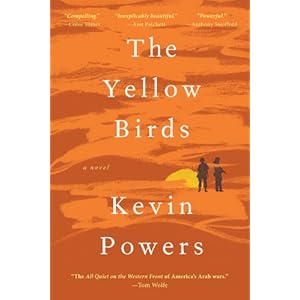I don't think it's possible to make an informed voting decision until we have given these men a full and complete hearing. They went out, some through a draft and some as volunteers, and put their lives on the line. Could you do that? I don't know if I could. Listen to what they are saying and try to understand that the writers are few and far between but that they speak for thousands who may not be able to articulate the emotions they've repressed.
Now that the seemingly endless wars in Iraq and Afghanistan are winding down I expect that we will begin to see some excruciating literature emerge from the ashes. One such piece is The Yellow Birds, a debut novel from Iraq War veteran Kevin Powers. http://www.kevincpowers.com/bio.htm This beautifully written book deserves wide readership.
Unlike Matterhorn which focused more on the insanity of the war itself, the confusion of the orders, and the inability of folks to understand what they were doing, Powers writes more about the aftermath of that insanity and confusion. It's a much more internal book. I felt that Powers was cutting himself open and laying out his insides for us to see. Extremely powerful stuff.
The story takes place in flashbacks to a few days of a battle in Al Tafar in Iraq. The platoon members are wrenchingly young, only kids that age could be convinced that they are invincible. The new boy on the block is Murph and one of the more experienced guys has been asked to kind of take Murph under his wing. But how, Powers asks, can one person be fully responsible for another in the chaos of battle? Murph is shaky and everyone senses it. The lieutenant's experience tells him he's dealing with a dead man walking. What happens in Al Tafar is not clear at first but it haunts young private Bartle for years to come.
What's most difficult and realistically addressed is the coming home. Bartle's mother is unable to break through her son's insistence that all is fine, though he sleeps away days and then months, refusing to take calls from friends, unable to feel comfortable in his own skin. Having absorbed the horrors of war, how can Bartle ever hang out on the river bank swilling beers and flirting with girls?
He says, "I started crying. Through my tears night had fallen. The girls in the hot summer night were toweling off and laughing, standing on the darkening rocks beneath the soft light of the lampposts on the nearby train bridge. I got up..." He had to walk away. He undressed and walked into the water. Hoping for redemption? Pleading to die in peace? The agony of living with the aftermath of war is palpable in these pages. This novel won't be out until mid-September but again, I can't say it strongly enough. We owe it to these young soldiers to read their accounts and think twice, and then three times, before we vote to send them off to war.


No comments:
Post a Comment